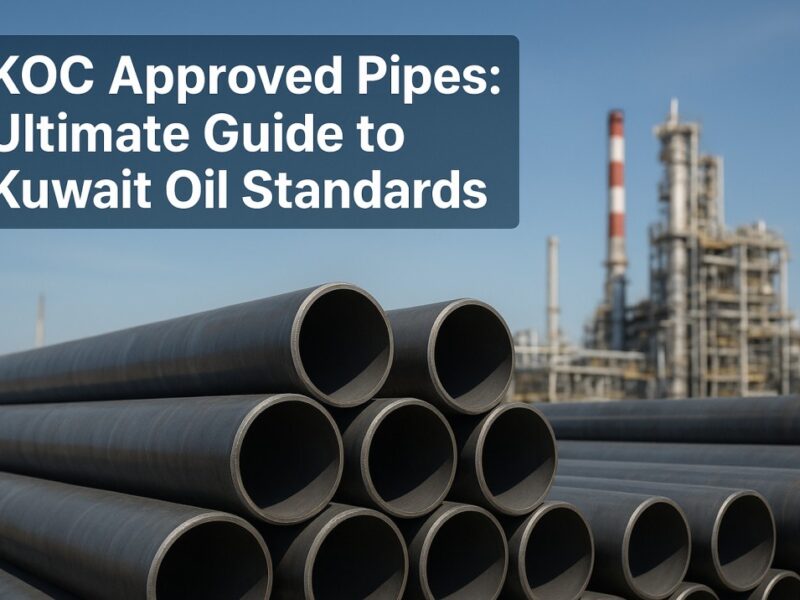
Introduction
The oil and gas industry in Kuwait is a cornerstone of the nation’s economy, and ensuring the highest standards of safety, reliability, and efficiency is non-negotiable. KOC specifically manufactures and tests approved pipes to meet the strict requirements of the Kuwait Oil Company (KOC), making them essential for exploration, drilling, production, and transportation projects.
In this article, we will break down what “KOC approved” means, why it matters, the different types of pipes, and how to choose the right supplier.
What “KOC Approved” Means
When KOC approves a pipe, it means the company has tested, evaluated, and certified it according to Kuwait Oil Company pipe standards. These standards cover a wide range of factors including material quality, corrosion resistance, pressure ratings, and long-term durability.
KOC has developed these specifications to ensure all pipelines and flowlines in its network operate without failures that could lead to costly downtime or safety risks. For manufacturers and suppliers, receiving approval from KOC signifies adherence to international codes such as API 5L and ASTM, combined with additional KOC-specific requirements.
Types of KOC Approved Pipes
Carbon Steel Pipes
The oil and gas industry widely uses carbon steel pipes that meet KOC specifications because of their strength and cost-effectiveness. Companies commonly install these pipes in main transmission lines.
Seamless Pipes
The choice between seamless and welded KOC pipes often sparks discussion. Produced without welding joints, seamless pipes offer superior strength and greater resistance to pressure. This makes them ideal for demanding applications where reliability is critical.
They are often preferred in high-pressure systems where reliability is critical.
Welded Pipes
Welded pipes, though generally more cost-effective, are manufactured with a longitudinal or spiral seam. They also meet KOC certified line pipes standards and are commonly used for lower-pressure applications.
Specialty Pipes
In addition to traditional steel options, KOC also approves specialty materials designed for corrosion protection in KOC pipes. These include pipes with special coatings, internal linings, or alloys that prevent rust and extend service life.
Why KOC Approval Matters
- Quality Assurance
KOC approval ensures compliance with international and local regulations. Every pipe undergoes strict quality assurance for KOC pipe manufacturing, minimizing risks of leaks or structural failures. - Safety
The oil and gas sector carries high risks. Using pipes that meet Kuwait Oil Company pipe standards is essential for ensuring the safety of workers and infrastructure. - Long-Term Cost Savings
While non-approved pipes may seem cheaper initially, they often lead to higher maintenance and replacement costs. KOC approved pipes are built to last, providing better ROI. - Project Compliance
For contractors working with KOC, using approved materials is a mandatory requirement. Any deviation can result in project delays, penalties, or rejection of the work.
Applications in Oil & Gas Industry
Flowlines and Pipelines
A large portion of KOC flowline and pipeline specs covers pipes used in transporting crude oil, natural gas, and refined products.
Offshore and Onshore Projects
From offshore rigs to onshore processing plants, KOC approved pipes are designed to withstand harsh environments, including high salinity and extreme temperatures.
Gathering Systems
Pipes are also used to collect oil and gas from multiple wells and transport them to central facilities for processing.
Seamless vs Welded: Which is Better for KOC Projects?
When comparing seamless vs welded KOC pipes, the choice largely depends on the project requirements:
- Seamless pipes are best for high-pressure and critical applications where strength and reliability are vital.
- Welded pipes are more economical and suitable for lower-pressure applications.
KOC often outlines specifications for where to use each type, ensuring maximum efficiency and safety.
How to Source KOC Approved Pipes
Choose Certified Suppliers
Not every manufacturer or distributor can provide KOC approved pipe suppliers certification. Always ask for compliance documents and approvals before making a purchase.
Verify Material and Standards
Ensure the pipes meet relevant API 5L pipes for KOC requirements, along with additional KOC criteria.
Look for Corrosion Protection Options
For projects in harsh environments, opt for pipes with coatings or linings that guarantee long service life and meet corrosion protection in KOC pipes requirements.
Request Certificates
Every shipment of KOC certified line pipes should come with mill test certificates, quality assurance documentation, and proof of KOC approval.
The Future of KOC Approved Pipes
With the global shift towards sustainability and efficiency, quality assurance for KOC pipe manufacturing is evolving. Manufacturers are introducing new materials, advanced coatings, and stricter inspection processes to meet the increasing demands of Kuwait’s oil and gas industry.
Manufacturers who keep pace with these developments will remain at the forefront of supplying the most reliable pipes to KOC projects.
Conclusion
KOC approved pipes are far more than just industrial components—they represent safety, reliability, and compliance with some of the world’s most rigorous oil and gas standards. Whether you’re sourcing carbon steel pipes KOC specifications, comparing seamless vs welded KOC pipes, or evaluating KOC approved pipe suppliers, ensuring compliance with Kuwait Oil Company pipe standards is non-negotiable.
By choosing the right materials and suppliers, companies can protect their workforce, reduce costs, and deliver projects that meet the highest standards of excellence.

Recent Comments